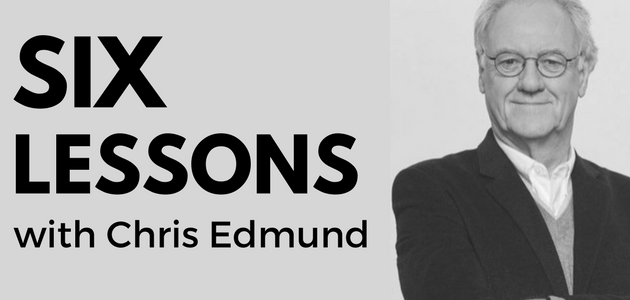
What I Learnt Interviewing Chris Edmund
I know Chris Edmund very well. He was the head of acting at the Western Australian Academy of Performing Arts when I studied there and is a friend and mentor. What I’ve always loved about Chris’s approach to acting is his emphasis on connection. Connection with text and with the other actor. This connection with text comes through preparation, truly understanding what you’re saying and yearning for clarity. Using keywords and the clues the playwright is giving you. More than any other acting coach I’ve worked with he pushes us as actors to be in relationship with the other actors on stage to work together and take the focus off ourselves.
As part of our podcast series, StageMilk Acting Conversations, I had a long form interview with Chris where we discuss acting, getting into acting school and working with actors. Have a listen:
Chris Edmund is a director, playwright, teacher and painter. He was the head of the acting department at The Western Australian Academy of Performing Arts (WAAPA) where he played a significant role in developing the world renowned acting and directing training over the last 25 years. Actors trained under his guidance include Hugh Jackman, Frances O’Connor and Jai Courtney. He is a published playwright and has directed countless productions around the world.
Six Lessons I Learnt from Chris Edmund
1. The notion of supporting your fellow actors. Generosity is at the core of great acting. This is especially true in a training environment. Working together as a class or supporting each other in a scene is so important. It’s not about you.
2. Have an objective. Always go after what you want in a scene or monologue. It gives the scene or monologue energy and dynamism. Have a clear objective and use tactics to achieve that objective.
3. Focus on the other actor. Are you really connecting? Chris comes back to this again and again. Are you focusing on you or are you really trying to affect the other actor? Putting your focus on the other actor alleviates self consciousness and relaxes you on stage. It also gives the scene life. We want to see people in relationship on stage.
4. Keep it simple. Actors are often praised in high school for making big character choices and this often doesn’t serve the scene. Especially whilst training as an actor come back to a simpler approach. Of course bold choices have their place, but it’s best to come back to a more natural form of acting and build from there. You don’t need to show you can act. Ask yourself: can I do less.
5. Flexibility. When auditioning for drama school or for a theatre production, always be flexible. Chris says in the interview that ” often we would get actors to do the exact opposite of what they prepared”. This is simply to see how flexible and dynamic the actor is. Being able to take direction is so important.
6. Preparation. In our interview we discuss how to get into drama school and one point that is so important is to prepare, thoroughly. It’s not about being rigid or having choices locked in stone, but being well prepared. This means reading the play, actioning your text, and thinking about your character. It also means, when auditioning for drama school, to be informed about the drama school.
Find the Truth in the Other Actor’s Eyes [Video]

Leave a Reply